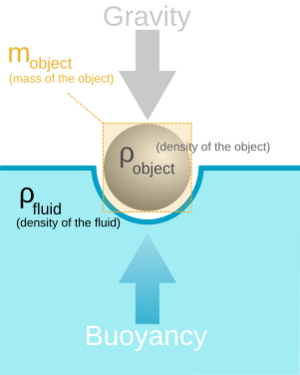Buoyancy facts for kids
In physics, buoyancy is a special force that pushes objects upward when they are in a liquid or air. It's why things float! The word "buoyancy" comes from the Spanish word boyar, which means "to float."
This upward push happens because of the different pressure on an object. The liquid or air around the object pushes on it from all sides. The pressure is stronger deeper down. This difference in pressure creates an upward force.
The total upward buoyancy force is exactly equal to the weight of the liquid or air that the object pushes out of the way (displaces). This force helps objects float or makes them feel lighter. Buoyancy is super important for many vehicles, like boats, ships, hot air balloons, and blimps.
Contents
How Density Affects Floating
Density is how much "stuff" is packed into a certain space. Imagine a feather and a rock of the same size. The rock is much denser because it has more mass packed into it.
When an Object Floats or Sinks
- If an object has the same density as the liquid it's in, its buoyancy is equal to its weight. It will stay in the middle, neither sinking nor floating to the top.
- If an object has a higher average density than the liquid, its buoyancy is less than its weight. This means it will sink. That's why small pebbles drop to the bottom of a pond.
- If an object has a lower average density than the liquid, its buoyancy is greater than its weight. This means it will float!
Why Big Ships Float
Think about a huge ship made of steel. Steel is much denser than water, so you might think it would sink like a rock. But ships float because of their shape! A ship encloses a lot of air inside its hull. This makes the ship's average density (the total mass of the ship divided by the total volume it takes up, including the air inside) much less than the density of water. Because its average density is lower, the ship displaces a lot of water, and the buoyancy force is strong enough to keep it afloat.
Related pages
Images for kids
-
An old British pound coin floats in mercury. Mercury is very dense, so the coin floats high!
See also
 In Spanish: Flotabilidad para niños
In Spanish: Flotabilidad para niños






